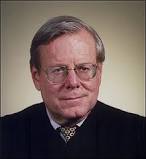Novartis ($NVS) and Roche ($RHHBY) can wash their hands of some kickback accusations. A federal judge tossed a long-standing whistleblower suit Tuesday, nixing allegations that the two drugmakers used kickbacks and off-label promotions to pump up sales of their asthma drug Xolair.
 |
| Judge William Young |
In dismissing the claims of three whistleblowers--all former Xolair sales reps--Judge William Young conceded that, given the evidence of lavish dinners and gifts, "fraud was probable." But the U.S. Justice Department, which had joined the suit, and the whistleblowers themselves failed to prove that the marketing shenanigans actually led to false claims to federal health programs.
The ruling is yet another False Claims Act (FCA) decision to snip away at the ties between off-label marketing and kickbacks on one side, and actual violations of the law on the other. The operative term is "particularity," and to Young's mind, the Xolair plaintiffs failed to be particular enough.
The lawsuit alleged that Roche's Genentech unit and Novartis, which co-marketed Xolair, told their sales reps to promote the drug for unapproved uses beginning way back in the early 2000s. Reps touted the drug for mild asthma and allergy symptoms and promoted it for kids with asthma, the suit says, even though the FDA hadn't yet approved the drug for those indications.
The companies also allegedly handed out expensive gifts, free medical and office equipment and free services to persuade providers to prescribe the drug. And even more to the FCA's point, sales staffers allegedly urged docs to use "improper medical codes" for Xolair, and helped physicians fill out medical necessity forms, to make sure insurance claims were paid.
One of the whistleblowers offered up details about those activities, Young allows, but "the detailed information she provides regarding the instructions she and her colleagues received from their manager to promote Xolair to [healthcare providers], even for unapproved uses, are nothing more than improper marketing practices and illegal kickback activities used by Novartis to increase sales."
And that's not enough to show that the company violated the FCA, Young concluded. None of the whistleblowers provided an actual example of a fraudulent Xolair claim for federal reimbursement, the judge said. And though they listed names of some prescribers, and submitted lists of targeted doctors--which "directly suggest the existence of illegal kickback activities." They didn't provide information "about the filing of the false claims themselves," Young wrote.
The allegations aren't proven--or disproven--and the companies are off the hook here. The ruling isn't just good news for Novartis and Genentech, however. It's another decision rejecting an FCA claim because specific evidence of specific medical claims was lacking. That's a high standard for whistleblowers, prosecutors and the Justice Department.
- see Judge Young's decision